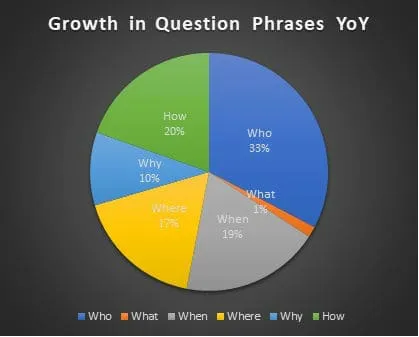

Popular voice assistants such as Siri and Alexa have become the go-to search tool for consumer queries. Top companies such as Microsoft, Google and Amazon are offering Voice technology feature on various handheld devices through services such as Google Home and Amazon Echo. With voice recognition becoming a standard in products, tech companies are showing great interest in leveraging speech recognition to derive value in business.
Voice Engine Optimization equips voice assistants with questions and answers to add relevance for queries that consumers are frequently asking. The year 2019 looks to further humanize voice assistants with an uptick in consumers’ search trends thereby enabling marketers to leverage voice engines to optimize content that can significantly drive revenue and traffic.
ComScore says that by 2020, 50% of all search-related queries would be voice searches.
Voice queries are conversational and often contextual. A study of 1400 smartphone users in the US have shown that:
- 40% use voice search for directions
- 39% use voice search to dictate a text message
- 32% use voice search to make a call
Majority of consumers think that voice search is great for multi-tasking. Studies by Search Engine Watch have proved that usage of conversational keywords such as “who”, “what”, “where”, “when” & “how” have been growing at a 61% rate year-on-year.

View the original article by Search Engine Watch on Question Phrase Growth here
Marketing leaders need to adopt a strategy that integrates voice in the consumer experience. Gartner’s study, “Voice as a UI on Consumer Devices”, predicted that 30% of consumer interactions with smart-technology devices would be voice-enabled in 2018. These consumer-machine interactions would eventually alter the future of SEO and revolutionize the future of brand advertising.
The future of search is personalized voice assistants. A little over 30% of consumers own a smart speaker such as Alexa and over 40% access the voice assistant daily according to an Adobe report. However, only 2% have used voice-enabled assistants to make an online transaction in 2018 which means the future holds the key to using voice as an important medium in the customer experience landscape and hence voice tech investments will become easier to procure.
How Can Marketers Adopt Voice Tech in Their SEO?
# Make your site HTTPS-compatible. If a website is HTTPS, it has been observed that there is a higher likelihood of generating more traffic from voice search. To put it mildly, over 65% of voice search results come from sites with HTTPS certificates.
# Build authoritative domain within your niche. Sites that have a lot of links, content, social shares & user experience deserve a larger piece of the pie and are the ones getting the larger cut of voice search traffic.
# Optimize your website to load in 4.5 seconds or less which is 50% faster than the average webpage. If the website loads quicker, the chance to get traffic from voice search increases as well. Marketers and potential business heads can use Google PageSpeed to check the site’s performance score.
# Adopt the ideology of having short, precise answers within your content. Like SEO, pages with over 2200 words perform better than webpages with 500 – 700 words. The more content you have, the more Google can index you for different terms, the more traffic you can acquire.
In conclusion, voice-enabled devices are the way forward and this emerging technology has a big role to play in contextual marketing and targeting of consumers to grab more traffic to drive business goals.
